

On Vision and Colors. On Vision and Colors (German: Ueber das Sehn und die Farben) is a treatise[1] by Arthur Schopenhauer that was published in May 1816 when the author was 28 years old.
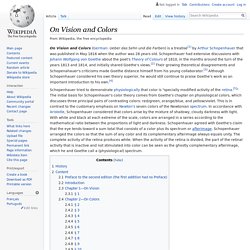
Schopenhauer had extensive discussions with Johann Wolfgang von Goethe about the poet's Theory of Colours of 1810, in the months around the turn of the years 1813 and 1814, and initially shared Goethe's views.[2] Their growing theoretical disagreements and Schopenahauer's criticisms made Goethe distance himself from his young collaborator.[3] Although Schopenhauer considered his own theory superior, he would still continue to praise Goethe’s work as an important introduction to his own.[4] Schopenhauer tried to demonstrate physiologically that color is "specially modified activity of the retina.[5]" The initial basis for Schopenhauer's color theory comes from Goethe's chapter on physiological colors, which discusses three principal pairs of contrasting colors: red/green, orange/blue, and yellow/violet. History[edit] Categorical imperative. I ought never to act except in such a way that I could also will that my maxim should become a universal law. ~ Immanuel Kant.
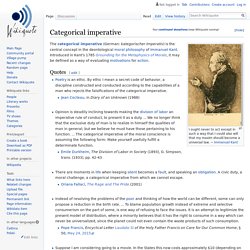
Kant's Categorical Imperative And The Golden Rule: What's The Difference? Categorical-imperative. From The Internet Encyclopedia of Philosophy Copyright 2001.
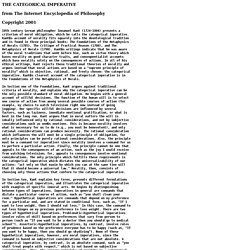
KANTIAN ETHICS. Definition of Categorical Imperative by Merriam-Webster. Categorical imperative. Noun Ethics . the rule of Immanuel Kant that one must do only what one can will that all others should do under similar circumstances. the unconditional command of conscience.

Kant and Categorical Imperative. Categorical Imperative. Internet Encyclopedia of Philosophy : Categorical Imperative Catholic Encyclopedia The Categorical Imperative is NOT the Golden Rule With the Golden rule you are to: Act as you would have others act towards you.
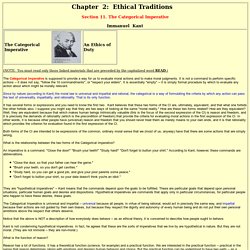
The Golden Rule Around the World. Categorical imperative. Categorical imperative. The categorical imperative (German: kategorischer Imperativ) is the central philosophical concept in the deontological moral philosophy of Immanuel Kant.
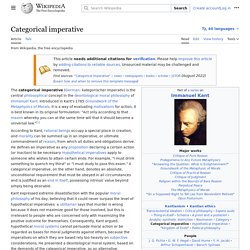
Introduced in Kant's 1785 Groundwork of the Metaphysics of Morals, it may be defined as a way of evaluating motivations for action. According to Kant, sentient beings occupy a special place in creation, and morality can be summed up in an imperative, or ultimate commandment of reason, from which all duties and obligations derive. He defined an imperative as any proposition declaring a certain action (or inaction) to be necessary. Hypothetical imperatives apply to someone who wishes to attain certain ends. For example: If I wish to quench my thirst, I must drink something.If I wish to pass this exam, I must study.
Qua dictionary definition. Intelligent. Qua. Adverb as; as being; in the character or capacity of: The work of art qua art can be judged by aesthetic criteria only.

Origin of qua 1640–50; < Latin quā feminine ablative singular of quī who Dictionary.com Unabridged Based on the Random House Unabridged Dictionary, © Random House, Inc. 2019 Examples from the Web for qua. Lord Shaftesbury [Anthony Ashley Cooper, 3rd Earl of Shaftesbury] 1.
![Lord Shaftesbury [Anthony Ashley Cooper, 3rd Earl of Shaftesbury]](http://cdn.pearltrees.com/s/pic/th/shaftesbury-anthony-ashley-190524791)
Introduction 1.1 Life and works Shaftesbury lived from 1671 to 1713. His grandfather, the first Earl of Shaftesbury, oversaw Shaftesbury’s early upbringing and put John Locke in charge of his education. Shaftesbury would eventually come to disagree with many aspects of Locke’s philosophy, but Locke was clearly a crucially important influence on Shaftesbury’s philosophical development, and the two remained friends until Locke’s death. The first work Shaftesbury published was an edited collection of sermons by Benjamin Whichcote, in 1698. Anthony Ashley-Cooper, 3rd Earl of Shaftesbury. English politician, philosopher and writer Anthony Ashley Cooper, 3rd Earl of Shaftesbury Anthony Ashley Cooper, 3rd Earl of Shaftesbury Bt (26 February 1671 – 16 February 1713) was an English politician, philosopher and writer.
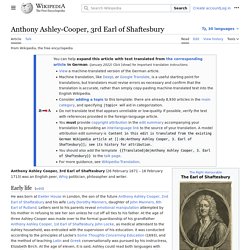
Biography[edit] Con-Textos Kantianos. International Journal of Philosophy. International Journal of Philosophy N.o 5, Junio 2017, pp. 58-74 Doi: 10.5281/zenodo.805716 The Development of Kant’s Theory of Moral Feeling El desarrollo de la teoría kantiana del sentimiento moral ZHENGMI ZHOUHUANG Institute of Philosophy of Beijing Normal University, China Abstract Kant’s critical theory on moral feeling can be divided into two stages: early and late.
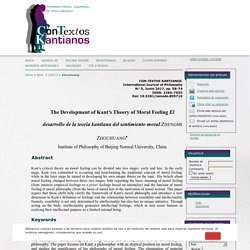
Keywords Kant, moral feeling, moral motivation, intellectual feelings, sensibility, intellectuality. Kant and Hume on Morality. 1. Moral Philosophy and its Subject Matter Hume and Kant operate with two somewhat different conceptions of morality itself, which helps explain some of the differences between their respective approaches to moral philosophy. The most important difference is that Kant sees law, duty, and obligation as the very heart of morality, while Hume does not.
Francis Hutcheson. Hutcheson, Francis The Columbia Encyclopedia, 6th ed. Copyright The Columbia University Press. Francis Hutcheson (philosopher) Wisdom denotes the pursuing of the best Ends by the best Means. An Inquiry into the Original of our Ideas of Beauty and Virtue (1725), Treatise I, Sect. VWhence this secret Chain between each Person and Mankind? How is my Interest connected with the most distant Parts of it?
An Inquiry into the Original of our Ideas of Beauty and Virtue (1725), Treatise II: An Inquiry concerning Moral Good and Evil, Sect. IThat Action is best, which procures the greatest Happiness for the greatest Numbers; and that worst, which, in like manner, occasions Misery. Francis Hutcheson and David Hume were the two most prominent Scottish contributors to moral philosophy before Smith. Brief biography at the History of Economic Thought website. Scottish Philosopher. Francis Hutcheson: Biography on Undiscovered Scotland. 17th and 18th Century Theories of Emotions > Francis Hutcheson on the Emotions.
Francis Hutcheson - Online Library of Liberty. Scotch-Irish philosopher. Hutcheson, Francis. Francis Hutcheson. Heteronomous definition and meaning. Autonomy/heteronomy. Autonomy is the capacity for self-government. Agents are autonomous if their actions are truly their own. The necessity of this moral liberty appears in Rousseau, and is a cornerstone of Kant's ethical theory, in which possessing autonomy of the will is a necessary condition of moral agency. The difficulty in the concept is that our desires, choices, and actions are all partly caused by factors outside our control, including those factors originally responsible for our characters. So true autonomy can easily seem to be a myth. Yet the concept is important, since it is plausible to hold that only agents acting autonomously are responsible for their actions.
In the ethics of Kant the terms are more specific. Definition of heteronomy in English by Oxford Dictionaries. Noun See heteronomous ‘One form of philosophical modernism is a radical self-reflexivity and self legislation that stands against heteronomy.’ ‘Because heteronomy and autonomy reflect political and cultural rather than purely linguistic factors, they can change.’ ‘Its opposite is not dependence, but heteronomy, where we feel our actions are controlled by external forces, regardless of our own values and interests.’
‘But focusing on these cases reinforces a sense of our passivity as agents: what Kant meant, I believe, by a heteronomy of the will.’ ‘Understood in this way, artistic consciousness tends to be inherently opposed to, resistant to and subversive of the heteronomy that underscores the commodified social relations of capitalist society.’ Pronunciation. Definition of heteronomous in English by Oxford Dictionaries. Heteronomy dictionary definition. Heteronomy - definition of heteronomy by The Free Dictionary. Definition of Heteronomy by Merriam-Webster. Heteronomy. Heteronomy. Heteronomy refers to action that is influenced by a force outside the individual, in other words the state or condition of being ruled, governed, or under the sway of another, as in a military occupation.
Immanuel Kant, drawing on Jean-Jacques Rousseau,[1] considered such an action nonmoral.[2][3] It is the counter/opposite of autonomy. Definition of Apodictic by Merriam-Webster. Apodictic - Dictionary Definition. Apodictically. Apodictic - definition of apodictic by The Free Dictionary. Analytic/Synthetic Distinction - Philosophy. Introduction “The analytic/synthetic distinction” refers to a distinction between two kinds of truth. The Definition of Analytic vs. Synthetic Statements. The Analytic/Synthetic Distinction. 1. The Intuitive Distinction. Synthetic proposition. Analytic–synthetic distinction.
The analytic–synthetic distinction (also called the analytic–synthetic dichotomy) is a semantic distinction, used primarily in philosophy to distinguish propositions (in particular, statements that are affirmative subject–predicate judgments) into two types: analytic propositions and synthetic propositions. Analytic propositions are true by virtue of their meaning, while synthetic propositions are true by how their meaning relates to the world.[1] However, philosophers have used the terms in very different ways. Furthermore, philosophers have debated whether there is a legitimate distinction. Synthetic Proposition. Any proposition whose truth is dependent on the relationship between the content of the proposition and the world is labeled Synthetic.
Kant: Fundamental Principles of the Metaphysic of Morals. PrelimPrud. Apodictic definition and meaning. Apodictic definition and meaning. Apodicticity. Propositions that are demonstrably, necessarily or self-evidently true "Apodictic" or "apodeictic" (Ancient Greek: ἀποδεικτικός, "capable of demonstration") is an adjectival expression from Aristotelean logic that refers to propositions that are demonstrably, necessarily or self-evidently true.[1] Apodicticity or apodixis is the corresponding abstract noun, referring to logical certainty.
Apodictic propositions contrast with assertoric propositions, which merely assert that something is (or is not) true, and with problematic propositions, which assert only the possibility of something being true. Apodictic judgments are clearly provable or logically certain. For instance, "Two plus two equals four" is apodictic. "Chicago is larger than Omaha" is assertoric.
Apodictic a priorism[edit] Apodictic. Definition of apodictic in English by Oxford Dictionaries. Adjective formal Clearly established or beyond dispute. ‘Not all of these nine statements are totally independent, and the list makes no claim for apodictic completeness or ultimate correctness.’ Apodictic - Dictionary Definition. Definition of Apodictic by Merriam-Webster. Learning English Grammar. Imperative - Dictionary Definition.
Imperative mood. Definition of Imperative by Merriam-Webster. Imperative. Pr.nd. Wolff's Ontology: Existence as Complement of Possibility. Kant's Moral Philosophy. Moral Philosophy - Ethics Unwrapped. Ethics. Natural philosophy. Natural philosophy.